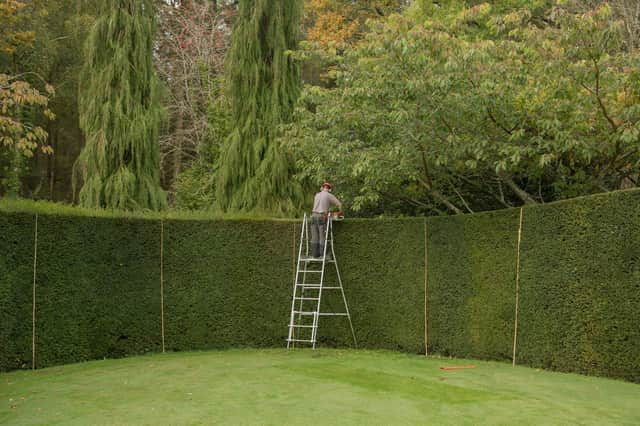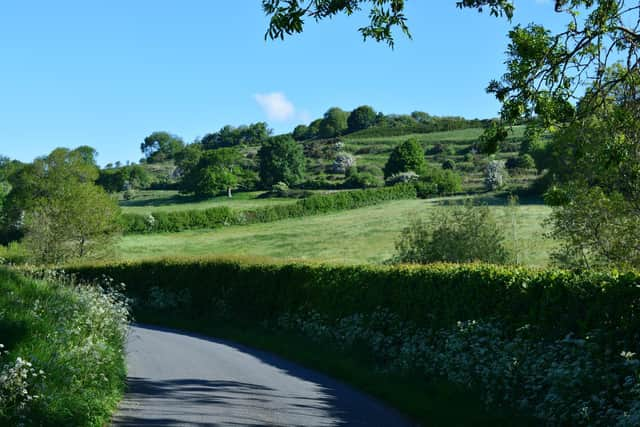RHS in praise of the humble hedge - "often the hero feature in any garden"
This article contains affiliate links. We may earn a small commission on items purchased through this article, but that does not affect our editorial judgement.


From the suburbs to the countryside they are the sensible staple of the British landscape.
Subtle in their presence, hedges can easily be overlooked amid their more eye-catching garden bedfellows.
Advertisement
Hide AdAdvertisement
Hide AdBut who can imagine rolling rural vistas without them; or deny their ubiquitous role in the suburban tapestry?


Where would we be without a hedge over which to share a neighbourly gossip - or draw up the battle lines of local disputes?
However, these stalwart living boundaries also serve a much greater purpose in terms of supporting biodiversity and fighting back against climate change.
Royal Horticultural Society (RHS) research has already shown that hedges can improve air quality, slow the flow of rainwater, reduce noise, provide shelter for wildlife and help regulate temperature through shading and cooling - with beech, privet and holly among those known to provide all-round benefits.
Advertisement
Hide AdAdvertisement
Hide AdFeatures such as leaf shape, texture and branch structure are all thought to make them more adept at various roles.
In the wake of the storms which hit the UK in February, the RHS urged gardeners to swap felled fences for hedges.
“Establishing a new hedge or maintaining an existing one may be the single most important action a gardener can take to combat the extremes of climate change, and support biodiversity,” said Mark Gush, the RHS head of environmental horticulture.
“Whether this be through evaporative cooling relief from heat waves, screening and protection from high winds, water uptake to alleviate extreme rainfall events, pollutant capture from traffic, or provision of wildlife habitat and corridors, hedges are great all-rounders.”
Advertisement
Hide AdAdvertisement
Hide AdHowever a monoculture of hedges, as is traditional in many gardens and urban areas, can leave hedges susceptible to disease and limit biodiversity.
Planting and management can also act as a deterrent for gardeners.
But such is the significance of the hedge, the RHS has secured funding to deepen our understanding.
Research
The charity is doubling down on its research into green infrastructure benefits for urban areas.
Advertisement
Hide AdAdvertisement
Hide AdWith £100,000 fellowship funding from the Royal Commission for the Exhibition of 1851, the RHS will investigate what it is about different varieties of hedge that mean they provide important ecosystem services, the benefits of mixed hedging, and the practicality of planting and maintaining them.
Led by principal horticultural scientist, Tijana Blanusa, the two-year project will research the best combinations of hedges for year-round impact in a laboratory setting and via real world application at a school.
The six combinations of mixed hedging that will be trialled will be drawn from four hedging plants: privet (Ligustrum ovalifolium ‘Aureum’), hawthorn (Crataegus monogyna), western red cedar (Thuja plicata ‘Atrovirens’) and eleagnus (Eleagnus x ebbingei ‘Limelight’).
All have been chosen because of their accessibility and varying form and function, says the RHS.
Advertisement
Hide AdAdvertisement
Hide AdThe findings will be published in 2024 and are intended to aid the development of green and healthy urban environments.
“The humble hedge is often the hero feature in any garden,” said Tijana.
“Acting as a natural screen, they not only provide important environmental services but are relatively cheap, long-lasting and have only a small ground footprint.
“Knowing which planting combinations to choose to get the most environmental benefit, and how to look after them effectively, could enable wider uptake as we seek to future-proof our towns and cities.”
Advertisement
Hide AdAdvertisement
Hide AdFor more information about the RHS’ research visit www.rhs.org.uk.
Here's how water in our gardens can help nature: